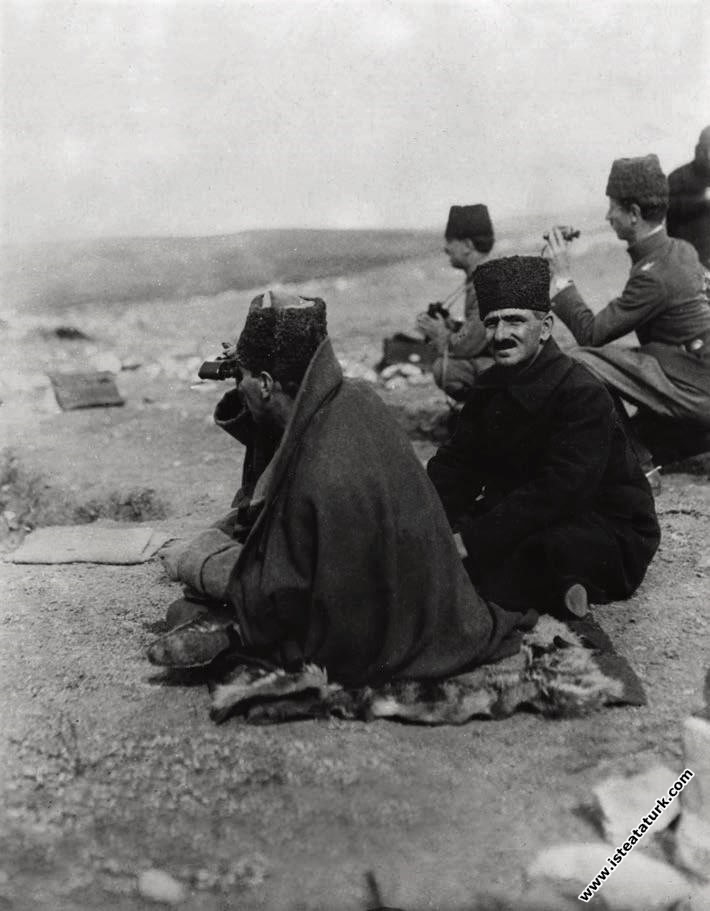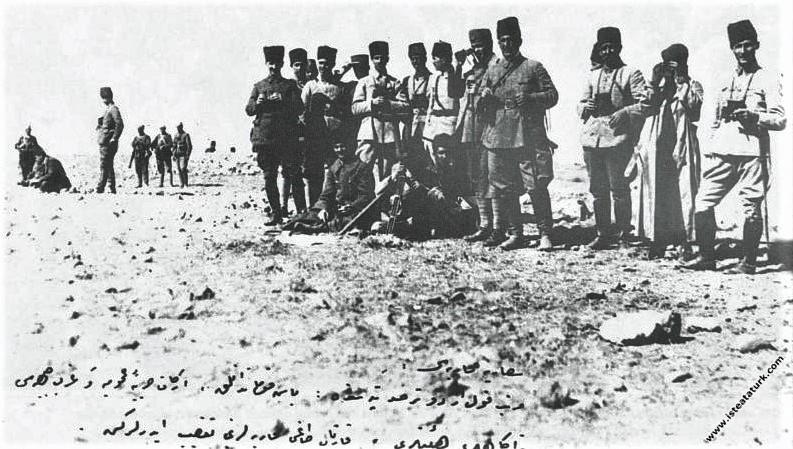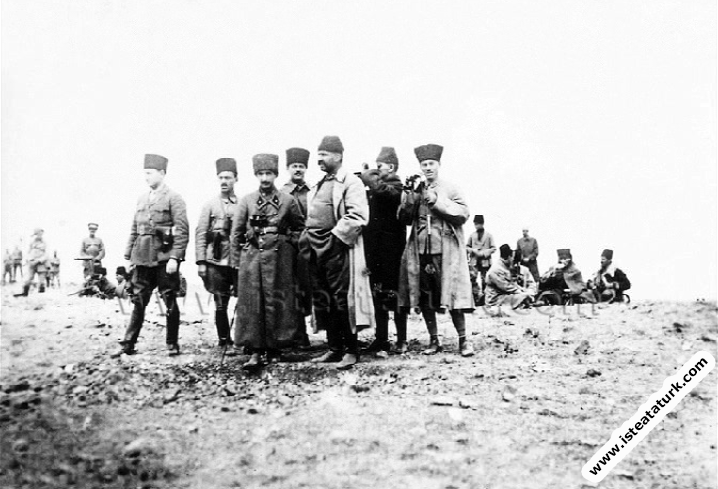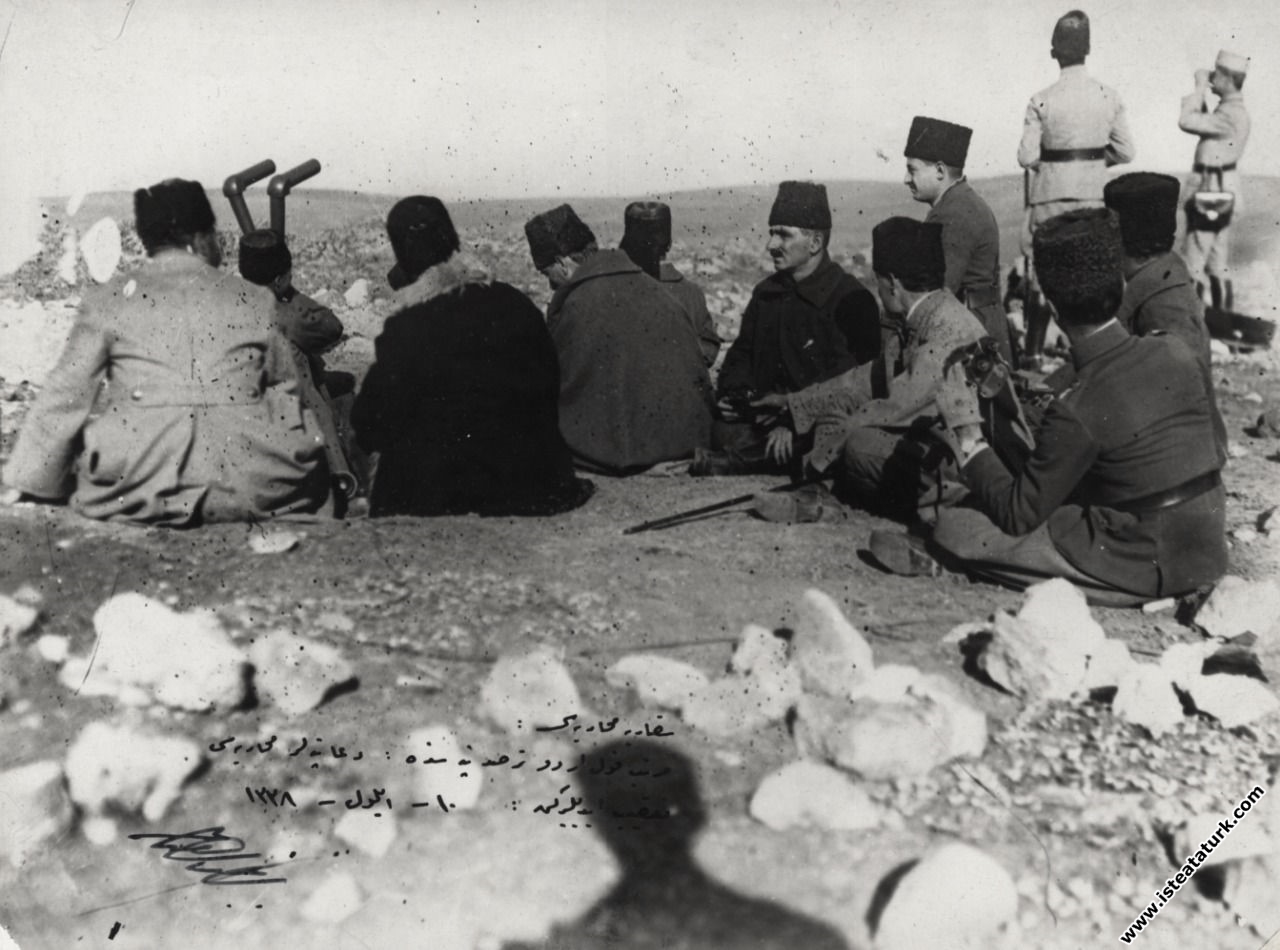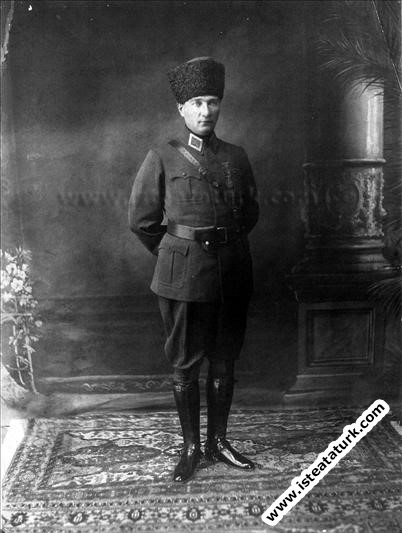While conducting the operation from Duatepe in the Battle of Sakarya. (10.09.1921)
| In the photo: He is accompanied by his aide Salih Bozok. |
| Photo source: ATATÜRK, T.C. Kültür Bakanlığı Yayınları, hazırlayan Mehmet Özel (Güzel Sanatlar Genel Müdürü), Sayfa:83 |
While conducting the operation from Duatepe in the Battle of Sakarya. (September 10, 1921)
Fracture of Mustafa Kemal's Rib:
Ali (Metin) Sergeant* tells;
The enemy had come as far as Polatlı. Atatürk, Fevzi Pasha, İsmet Pasha were in the farm of Türkoğlu Ali Ağa, opposite the village of Mali, with their headquarters.
One day, they set out with horses to tour the positions. They were visiting the artillery positions between Polatlı and Alagöz Farm and across the Karapınar village. A battery was pretty exposed anyway. When they saw this situation, they called the sergeant who was at the head of the battery. When the sergeant major said that the position captain had chosen it, they sent for the captain this time. Atatürk, who remained calm until the captain, who came galloping from the lookout, dismounted from his horse and came before them, scalded the commander of the battery, which was positioned in the open with all his ranks, and sent him back. At the same time, he ordered the artillery commander Pire Mehmet Bey to replace the battery commander. He was very embarrassed. He quickly jumped on his horse. Because he was riding too fast, he slipped over the saddle and fell to the other side. Although the ground was flat, a tiny stone had come across and broke his rib.
This incident happened so quickly that no one around him could help. Because he got on his horse right away. Although Fevzi and İsmet Pashas told them to allow the car to be brought, they did not accept, saying "we still have places to visit".
He was walking slowly, without speaking, even though his color was yellow. After a while, he turned to Ali Sergeant and said, "Child, I can't breathe." Thereupon, the cars were called and Atatürk's illness was reported. He got off his horse and sat on the ground until the cars arrived. Finally the cars arrived. Doctor Adnan (Adıvar) and Doctor Refik (Saydam) were sitting in it. After a short examination, the doctors said that his ribs were damaged and that they had to go to Cebeci Hospital.
Atatürk did not accept and said, "I will not leave here. If we cannot hold on to this line of defense, we must retreat to the Kızılırmak." After Fevzi Pasha, who was with him, assured him, "Don't worry, Pasha. I won't give you an inch of land. You go and get treatment."
First of all, after a short consultation in Çankaya, he went to the hospital immediately because it was decided to have his x-ray taken at Cebeci Hospital. At the end of the x-ray, it was determined that one of the ribs was broken and sunk into the liver, and the other two were damaged, and bandages were applied. When he was advised to rest without speaking for 20 days, Atatürk, who heard these words, could not help himself from making jokes, "I think God is helping Kostantin." At that time, Constantine was at the head of the Greek army. Atatürk said that he could not stay in the hospital for 20 days and returned to the front with a sunbed on the same day.
On the advice of the doctors, he was resting on the chaise longue and not speaking at all. He communicated his orders and requests in writing. The headquarters was very crowded. Besides Fevzi Pasha, İsmet Pasha, Halide Edip Hanım, Adnan and Refik Beys, there were Adjutant Salih and Muzaffer Beys. There was also Kazım (Özalp) Bey with his crew corps.
At bedtime, the phone rang. The third group was looking. Atatürk took the receiver and listened. On the other hand, Fevzi and İsmet Pashas were summoned. Fevzi Pasha was praying. İsmet Pasha was also dressed. Meanwhile, Atatürk was examining the map. As soon as Fevzi Pasha finished his prayer, they came with Ismet Pasha. Atatürk, who had not spoken until that day, suddenly began to talk to the pashas like a nightingale. Upon his decision, Fevzi Pasha said goodbye and left the headquarters in the morning prayer.
Since there was no news from Fevzi Pasha until the afternoon that day, Atatürk was curious. As per his orders, no one left the phone. Worries were growing.
Finally, in the afternoon, the phone rang. Everyone was excited. No one spoke at all on the other end of the phone. Atatürk was trying to understand something from their faces, his steely eyes fixed on those on the receiver.
No one spoke on the phone. But when he paid a little attention, the sound of the marching band was heard. This was the Gazi Osman Pasha anthem, and his voice was getting closer and closer to the receiver.
They gave the handset to Atatürk. Maybe there was something extraordinary. As soon as Atatürk took the receiver to his ear, he smiled and ordered Kazım Pasha to be called immediately. He ordered Kazım Pasha, who had entered, that the phone was coming from Fevzi Pasha, that the situation was good, and that he should attack immediately with his crew corps.
The Sakarya Offensive, which enabled the enemy to withdraw to Eskişehir, was made during these sick days of Atatürk. God had helped the workers, not Constantine.
* Ali Metin In 1897, Mihalıççık district of Eskişehir. He was born in Çukurören (Çukurviranlı) village. He is known as 'Ali of the Pilgrims' in his village. His father's name is Hacı İsmail and his mother's name is Fatma Hanım. With the start of the First World War, he voluntarily enlisted in the army in 1915. During his military service, he caught the eye of Enver Pasha during an inspection and started to serve as his aide. He was taken to the Junior Officer's School in Sivas because he was literate and had a sense of duty. Later, he served as a commanding sergeant alongside Kazım Karabekir and Atatürk. Between 1919 and 1925, he was a commanding sergeant with Atatürk. He returned to his hometown in 1925 due to his health condition. He died on 31 July 1972. A military unit came from Ankara, took his body and buried him in Cebeci Military Cemetery.
Source: Mustafa Kemal'in "Can Yoldaşı" Ali Çavuş, Zeynel Lüle, Doğan Kitap, 1. Baskı, Kasım 2008, ISBN: 978-605-111-033-2. Sayfa: 112-114
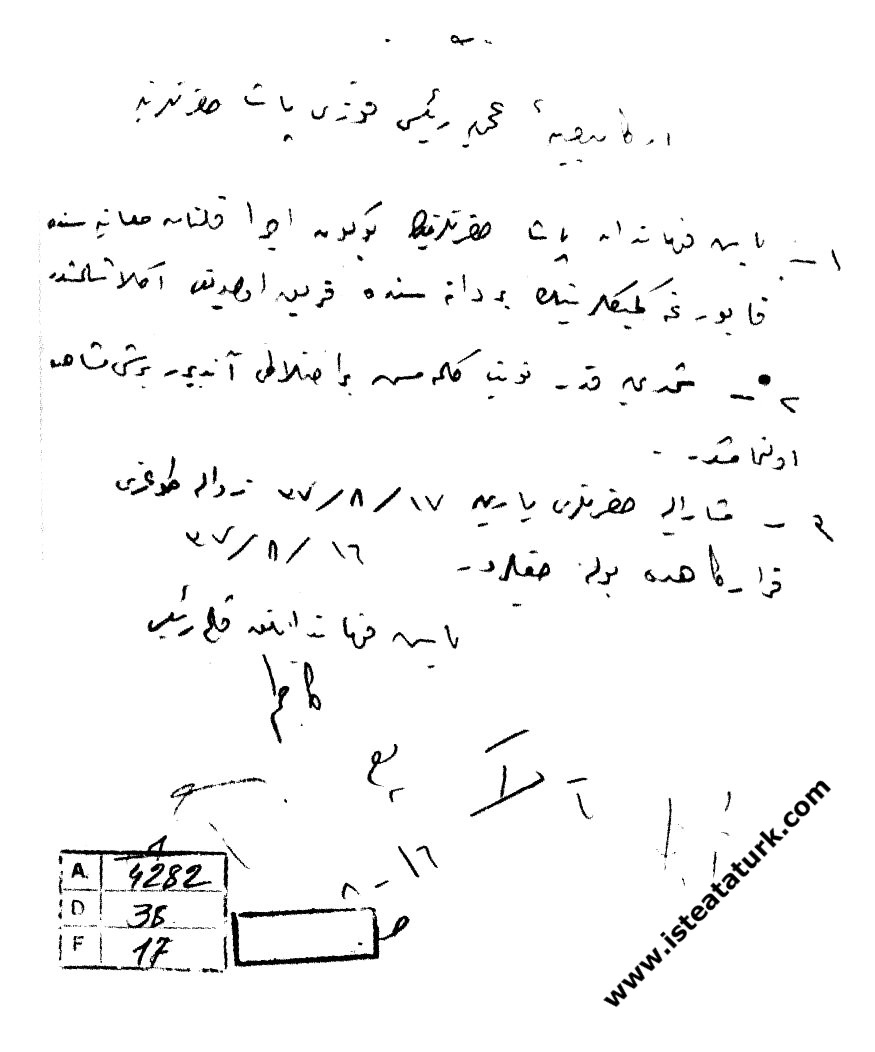
The report of Mustafa Kemal Pasha, Commander-in-Chief, whose rib was broken in the Battle of Sakarya, about Fevzi Pasha.
Actual text in Ottoman Turkish:
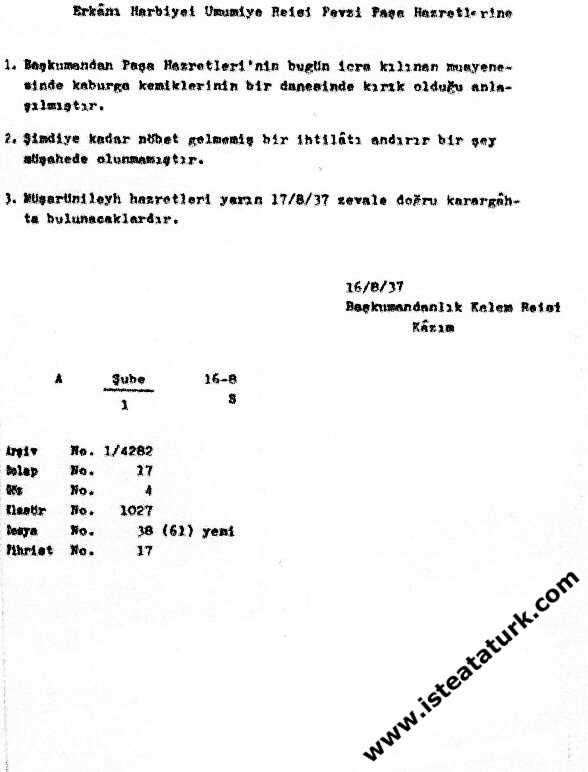
WOUNDED MUSTAFA KEMAL
I
(Halide Edip Adıvar wanted to join the army as a soldier. This request was accepted by the Commander-in-Chief and an order was given to go and join the Western Front. We are on the eve of the Battle of Sakarya. Mustafa Kemal is in the village of Alagöz, next to the front).
... An officer took me to Mustafa Kemal Pasha's headquarters. On the left, under the mounds of earth, a few houses were lit. It was only coming from the darkness. It was the communication of a soldier who provided the telephone service in O with a village called "groans, tar, groans, tar". The right side is a pit, water is running through it. There are three more houses behind it. Behind these houses are tents with their lights still on; a long and pointed pole; radio equipment. Village roads are dark and muddy. The moon has set, it's midnight. We crossed a small wooden bridge and went to the house on the other side. Mustafa Kemal Pasha's guards are at the door; one of them took me upstairs. Pasha's aide, Muzaffer Bey, took me to Pasha's room. An Anatolian room that is very bright and has the only luxury lamp.
Mustafa Kemal Pasha tried to get up from his seat with difficulty. Because his ribs were still in pain. I went to Pasha with absolute reverence in my heart. In that humble room, he represented the decision of all the youth, "To risk dying so that a nation may live. Neither palace, nor fame, nor any power can come close to his greatness in that room." I went and kissed your hand.
- After saying "You're right, ma'am, " he showed me a chair. And he asked about news about Ankara. At the same time, he bent over a map on the wooden table and explained the situation in such a clear and simple way that even a four-year-old could understand it. Here, Sakarya is curling up. Pins have been placed around the river with flickering red and blue paper butterflies on them. If I told Mustafa Kemal Pasha about my feelings about the military situation, he would definitely laugh. The Greek army seemed to approach Ankara like a huge monster. Contrary to this, the Turkish Army was trying to prevent this monster from engulfing Ankara by curling up in the east of Sakarya. The black beast was so huge that it was frightening.
"What will we do if he goes to Ankara and leaves us behind?" I asked. He laughed like a fearsome tiger.
- " Have a good trip, sirs " I say; I will destroy them in the emptiness of Anatolia by hitting them from behind.
Source: Halide Edip Adıvar, The Turkish Test by Fire
II
Dr. Mim Kemal (Oke) 1 narrates:
While Mustafa Kemal Pasha was inspecting the front before the Battle of Sakarya, his ribs were broken when his animal was startled. Murat Bey and my friend, we examined him in a modest room in Çankaya. We went together to Cebeci Military Hospital for X-rays. Kazım Pasha, Adnan (Adıvar) 2 Bey were also there. Pasha was in a lot of pain. The tip of one of his broken ribs was poking around his liver, and he was not breathing. We immediately identified the broken side with plaster, which we could hardly supply. They were comfortable. Here is the Pasha:
They said, "God is helping Constantine, but I can also work this way".
Despite the advice to rest, they again got into their cars and ran to the front and conducted the Battle of Sakarya.
Mustafa Kemal Pasha was running from place to place in the Battle of Sakarya for twenty-two days and nights; Three horses broke under him, an accident happened and three ribs of Mustafa Kemal Pasha were broken. Doctors who healed the fractures at Cebeci Hospital in Ankara recommended absolute rest. He did not listen and rushed back to the front; One day, while describing this incident, he said:
“What do you think, my broken ribs healed the day I gave the army the last order of charge.” 3
1 Mim Kemal Öke, (1884-1955), Professor of Surgery, was one of the physicians Atatürk trusted. He was closely interested in Atatürk's health until his death.
2 Abdülhak Adnan Adıvar, (1882-1955), Member of Parliament, Writer, Historian and Doctor. He is one of the founders of the Progressive Republican Party.
3 BANOĞLU, Niyazi Ahmet, Atatürk with wit and jokes, Garanti Printing House, Istanbul 1967, p. 194-195.
Source: Atatürk’ten Gençliğe Unutulmaz Anılar, Ahmet Gürel, Mayıs 2009
